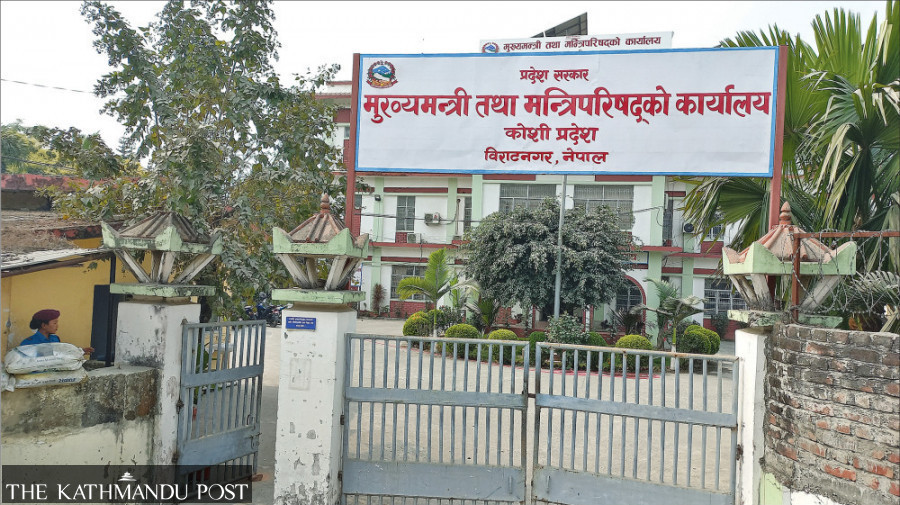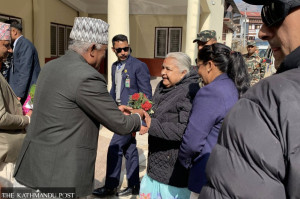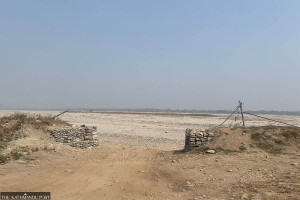Koshi Province
Supreme Court upholds incumbent UML-led government in Koshi
Verdict was influenced by ex-chief minister Kedar Karki’s refusal to seek a trust vote after CPN-UML members withdrew support, says court official.
Post Report
The Supreme Court on Tuesday quashed the writ petition challenging the decision of Koshi Province Head Parshuram Khapung to relieve Kadar Karki as chief minister and call for a new government.
Karki had challenged Khapung’s decision at the top court demanding its order to reinstate him as chief minister. Following three days of continuous hearing, a full bench of justices Kumar Regmi, Nahakul Subedi, and Abdulajeej Musalman scrapped the petition allowing the incumbent government led by CPN-UML’s Hikmat Karki to continue.
“The writ petition by Kedar Karki has been quashed. The details of the verdict will be provided later in a full text,” said Govinda Prasad Ghimire, information officer at the court.
He said refusal of the former chief minister Kedar Karki to seek a vote of trust even after the provincial assembly members withdrew their support was one of the bases for the verdict from the full bench.
On April 8, the UML provincial assembly members withdrew their support to Kedar Karki. The Congress provincial assembly member had become chief minister on October 14 defying the party’s instruction to support a CPN (Maoist Centre) candidate.
Opposing the party’s decision to back Indra Bahadur Angbo of the Maoist Centre in the chief ministerial race, eight provincial assembly members from the Congress in the country’s eastern province, decided to form a government led by Kedar Karki with the CPN-UML’s support. While 21 members from the party supported Angbo as per the decision of the Congress top brass, eight who were close to dissident Congress leader Shekhar Koirala refused to oblige. Karki became chief minister with support from 39 lawmakers from the UML in the 93-strong provincial assembly.
The support of the UML provincial assembly members was a must for him to land the chief ministership.
However, he refused to seek a vote of confidence even as the UML lawmakers withdrew their support. Kedar Karki had argued that since he became the chief minister with support of individual members of the provincial assembly as per Article 168 (5) of the constitution, the UML could not withdraw the support. If the government formed under 168 (5) falls the province goes to a snap poll, according to him.
The top court has refused to buy his argument. Constitutional lawyers say the full bench verdict has given a clear message that the provincial assembly cannot be dissolved as long as there is an option to form a new government. “The court has made clear that the one leading the government must prove majority-support in the provincial assembly to remain in power,” said Mohan Lal Acharya, a constitutional lawyer.
Amid Kedar Karki’s reluctance to seek a trust vote, the Koshi Provincial assembly on April 19 passed a resolution directing him to do so citing his lack of majority in the provincial assembly. As he continued to ignore the call, Khapung on May 8, a month after the UML lawmakers withdrew their support, called for the formation of a coalition government.
The UML’s Hikmat Karki had staked claim for the post with the support of 52 lawmakers—39 from his own party and 13 from the CPN (Maoist Centre). The support of 47 lawmakers is required for a majority to form the government in the 93-strong assembly.
Khapung on May 9 appointed him as the chief minister. Kedar Karki had filed the petition on the same day demanding an interim order to reinstate him. After a preliminary hearing, a single bench of Justice Hari Phuyal, on May 10, had asked the defendants including the Office of Province Head to furnish reasons within 10 days as to why the appointment was made and why not to issue an order as sought by the plaintiff. Phuyal’s bench, however, had refused to issue the interim order.
Incumbent chief minister Hikmat Karki, on May 13, had got the vote of confidence while the case against him was still sub judice.




 14.12°C Kathmandu
14.12°C Kathmandu












